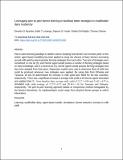Leveraging peer-to-peer farmer learning to facilitate better strategies in smallholder dairy husbandry

View/
Date
2020-12-02Author
Nyambo, Devotha G.
Luhanga, Edith T.
Yonah, Zaipuna O.
Mujibi, Fidalis D. N
Clemen, Thomas
Metadata
Show full item recordAbstract
Peer-to-peer learning paradigm is seldom used in studying how farmers can increase yield. In this article, agent-based modelling has been applied to study the chances of dairy farmers increasing annual milk yield by learning better farming strategies from each other. Two sets of strategies were considered; in one set (S), each farmer agent would possess a number of farming strategies based on their knowledge, and in a second set (S'), farmer agents would possess farming strategies that they have adopted from their peers. Regression models were used to determine litres of milk that could be produced whenever new strategies were applied. By using data from Ethiopia and Tanzania, 28 and 25 determinants for increase in milk yield were fitted for the two countries, respectively. There was a significant increase in average milk yield as the farmer agents interacted and updated their S'– from baseline data, average milk yield of 12.7 ± 4.89 and 13.62 ± 4.47 to simulated milk yield average of 17.57 ± 0.72 and 20.34 ± 1.16 for Tanzania and Ethiopia, respectively. The peer-to-peer learning approach details an inexpensive method manageable by the farmers themselves. Its implementation could range from physical farmer groups to online interactions.
URI
https://doi.org/10.1177%2F1059712320971369https://dspace.nm-aist.ac.tz/handle/20.500.12479/1044
